
 Highly Recommended ***** Obsession. Mania. Delusion. Since the premiere of The Queen of Spades in 1890, we’ve developed a musical vocabulary to represent these states of mind, but few composers could outdo Peter Tchaikovsky. One of his many operatic adaptations of the works of Alexander Pushkin, Tchaikovsky’s Queen of Spades or Pikovaya Dama is well-respected but seldom performed outside of Russia. It’s a challenging work that musically draws on everything from baroque opera, to Russian folk song, to symphonic rumbling, and the story it depicts is one of isolation and heartless cruelty. But the production originally directed by Brandon Jones, now playing for the first time at the Lyric, captures the anxieties as well as the absurdities that have only made this work more resonant.
Highly Recommended ***** Obsession. Mania. Delusion. Since the premiere of The Queen of Spades in 1890, we’ve developed a musical vocabulary to represent these states of mind, but few composers could outdo Peter Tchaikovsky. One of his many operatic adaptations of the works of Alexander Pushkin, Tchaikovsky’s Queen of Spades or Pikovaya Dama is well-respected but seldom performed outside of Russia. It’s a challenging work that musically draws on everything from baroque opera, to Russian folk song, to symphonic rumbling, and the story it depicts is one of isolation and heartless cruelty. But the production originally directed by Brandon Jones, now playing for the first time at the Lyric, captures the anxieties as well as the absurdities that have only made this work more resonant.
Tenor Brandon Jovanovich plays Gherman, a strange, loner soldier who pines for a noblewoman named Lisa (soprano Sondra Radvanovsky). But she’s engaged to Prince Yeletsky (Lucas Meachem), and Gherman does not know at first that she is unhappy about this because she feels inadequate for him. Gherman’s fellow soldier, Tomsky (Samuel Youn), reveals an interesting tidbit about Lisa: her grandmother, the Countess (Jane Henschel), learned an occult formula for winning at faro and earned the nickname “Queen of Spades” for how renowned she was in her heyday. Gherman becomes fixated on learning the winning formula, even after Lisa expresses her affections for him, and even though it was prophesized that the Countess would die if she revealed the secret and take a terrible revenge.
The work is more about mood than plot, but Tchaikovsky’s music and Jones’s staging deliver a foreboding mood indeed. Peter Tchaikovsky’s brother, Modest, wrote the libretto, and while Gherman has stronger feelings for Lisa here than in Pushkin’s novella, it’s still a story that is characterized by deranged selfishness. Peter Tchaikovsky did not just write a grim slog; instead, the scenes alternate between offbeat humor and despondency. Gherman, as played by Jovanovich, is a weird guy. He creeps along rooftops, looking in through Lisa’s skylight, and spends his confession of love trembling and facing away from her. Lisa only takes him because she’s as unbalanced as he is; set and costume designer John MacFarlane has created the most depressing room imaginable to confine her in and she’s under the bootheel of a strict governess. Gherman and Lisa’s perfunctory, fully-clothed sex at the end of Act I is as cringe-inducing as it sounds, making a convincing case for why Gherman’s erotic obsession shifts so quickly to the Countess’s card game magic.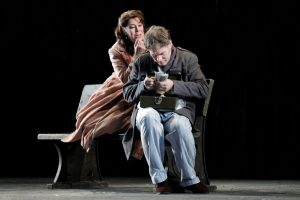
Director Brandon Jones’s love for abstract imagery has found an appropriate vessel in this hallucinogenic soundscape. In her private chamber, Lisa asks her friend, Pauline (Elizabeth DeShong) to sing for her, leading to an unusual instance in opera of a singer being accompanied only by a piano. (The song is about despair, naturally, and DeShong’s mezzo-soprano timbre captures the dark Romantism of Pushkin’s own era.) Contrasting this is the puppet intermezzo in Act II, directed by Chris Pirie, which is adorable and triggers Gherman’s giddy perception that the wedding party’s salute for the empress is also intended for him. Conductor Sir Andrew Davis is a master of shifting the opera’s musical tone with Gherman’s mercurial mood, and his and Jovanovich’s skills are especially on display during the opening of scene of Act III, when they plunge us into Gherman’s insomnia.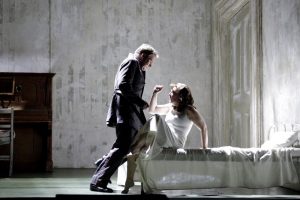
But while the opera is focused on its lead couple’s self-destruction, the production frames the much more easily sympathetic sadness of its title character. In her Lyric debut, mezzo-soprano Jane Henschel as the Countess is wry and prideful. Her aria, Je crains de lui parler la nuit, was borrowed from an eighteenth-century work, but feels timeless in its bitter loneliness. Of all the brutal moments in the show, I found the cruelest to be when the elderly Countess’s maids force her into a bathtub and then leave her there to fall asleep. Suddenly, this story isn’t just that of a displaced Byronic anti-hero wandering a dreamscape; it’s immediate and threatening, and that’s where Tchaikovsky’s tormented passion lives.
The Queen of Spades will continue at the Lyric Opera House, 20 N Upper Wacker Drive, Chicago, thru March 1, with the following showtimes:
February 23: 2:00 pm
February 26: 2:00 pm
March 1: 2:00 pm
Running time is three hours and forty-five minutes with two intermissions.
Performances are in Russian with English supertitles.
The Lyric offers parking deals with Poetry Garage at 201 W Madison St. if inquired about in advance. Tickets start at $49 with student discounts available; to order, visit LyricOpera.org or call 321-827-5600.
To see what others are saying, visit www.theatreinchicago.com, go to Review Round-Up and click at “The Queen of Spades.”

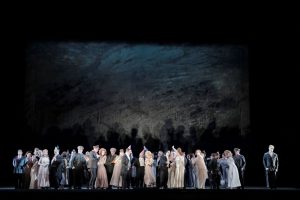


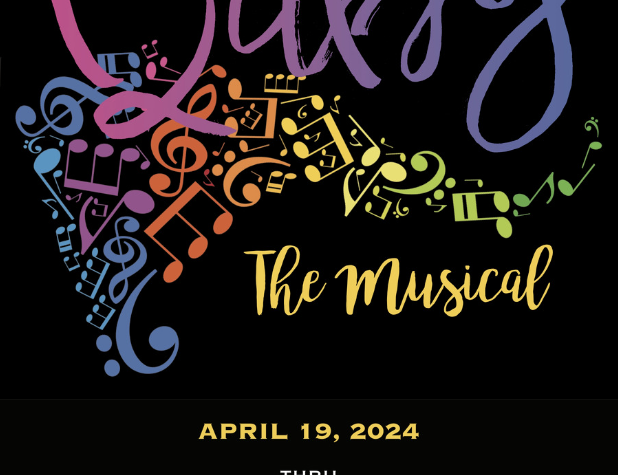
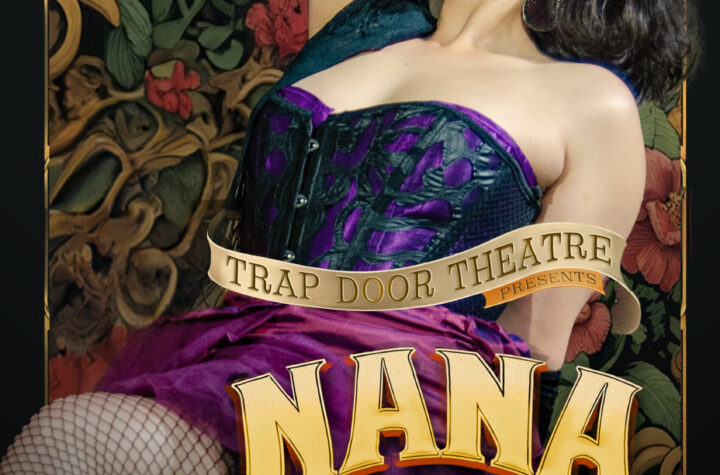

More Stories
“How to Know the Wild Flowers: A Map” reviewed by Julia W. Rath
“Baby: the Musical”
“Nana” reviewed by Jacob Davis